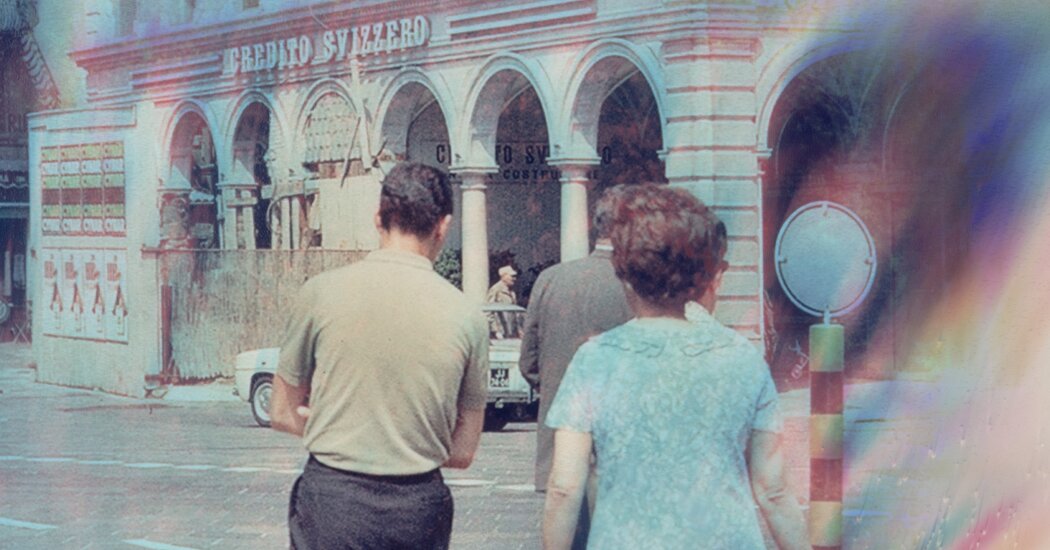When I was a child, my father, who had left the country only a few times, told me about the trip to Europe he took with his parents when he was 14, in 1966. She told me how much Nonie loved the immaculate Swiss streets and the planters buzzing with flowers; the fireplace in the house on the hill outside Lugano, where her father was born, with ingenious niches on either side for hanging clothes or heating bread; the palpable poverty of the house in Pozzuoli, a city just outside Naples, where Nonie's aunt had covered the walls with newspapers to better insulate. Every now and then, my dad would take out the projector and show me his Kodachrome slides.
As an adult, I spent years telling him that he and I should repeat the trip together, or at least a short version where we went to Switzerland and Italy, to Lugano and Naples, so he could show me where his family was from. But now that his Alzheimer's was progressing, that proposal took on new meaning. Revisiting the past, I hoped, would help him live better in the present. A few years ago, I read about a palliative treatment for those suffering from memory disorders called reminiscence therapy. The therapy involves triggering participants' strongest memories, those formed between the ages of 10 and 30, during the so-called “memory rebound moment”, when personal and generational identity take shape. Reminiscence therapy can take many forms: group therapy, one-on-one sessions with a caregiver, collaboration on a book that shares the patient's story, or simply conversation with friends. But the goal is the same: to comfort, engage, increase connection and strengthen the bond between patient and caregiver.
One of the most engaging iterations of reminiscence therapy is a place called Town Square, an adult daycare center for people with dementia. I visited shortly after it opened in 2018. The daycare center was an artificial village designed by the San Diego Opera to resemble a 1950s town. It had a diner, a beauty salon, a pet store, a movie theater, a gas station, and a town hall. By reproducing the time period in which participants' most vivid memories were imprinted, Town Square hoped to improve their quality of life. The decor offered a lot to talk about. In the living room, for example, a portrait of Elvis hung, and upon seeing it, a woman talked about her adolescence, teleporting into her past. “There is no time machine except the human being,” writes Georgi Gospodinov in his novel “Time Shelter,” about a psychiatrist who develops memory clinics that simulate past eras. I was initially skeptical of the venture; warehousing people in a double-locked stage where oldies played 24 hours a day seemed grotesque. But what I witnessed there – spontaneous reminiscences in a cheerful environment – was perhaps the only positive view of Alzheimer's I saw.
I wanted this for my father, I wanted to give him a sense of joy now that he had closed his shop, the place that was his world. Even if he wouldn't submit to adult day care, perhaps retracing his 1966 journey would be like taking him back to a tableau of his youth. In truth, I also wanted to replace the memories of the last terrible years with some new ones, for me as much as for him. I had spent the last 16 months making countless phone calls to his doctors, banks, and lawyers to negotiate insurmountable interest discounts. When he unknowingly undermined my efforts, making small, random payments or denying he had a disease, I would snap, and he would never hold it against me. No. He would vow to do better. Sometimes he would yell at me for being a nag and a “dickhead” (a demanding, controlling know-it-all, I think). But even when I pushed him to the point where he would hiss that I needed to move out of his house, I knew he loved me unconditionally and would apologize soon. He trusted me, even when I didn’t trust myself. Because of that, the ballast of my being, he asked for nothing in return, had no expectations. He never brought up a fight afterwards, and not just because of his disease. He didn’t hold a grudge like I did, vaguely, for the mistakes he had accumulated as his brain splintered, even though I knew none of it was his fault. And yet: why hadn’t he planned? Hadn’t he seen his mother suffer and fought to support her?





